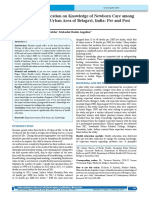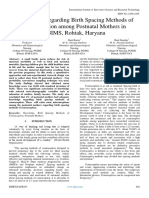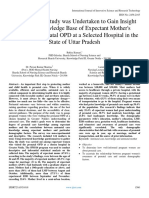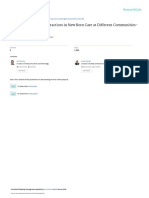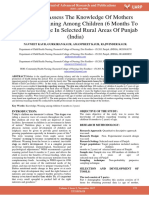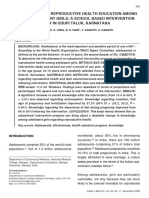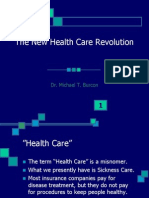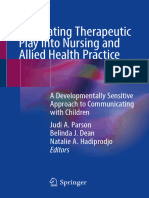Knowledge and Practices of Postnatal Mothers On Newborn Care in Tertiary Care Hospital of Udupi District
Knowledge and Practices of Postnatal Mothers On Newborn Care in Tertiary Care Hospital of Udupi District
Uploaded by
Anonymous nz9rhHCopyright:
Available Formats
Knowledge and Practices of Postnatal Mothers On Newborn Care in Tertiary Care Hospital of Udupi District
Knowledge and Practices of Postnatal Mothers On Newborn Care in Tertiary Care Hospital of Udupi District
Uploaded by
Anonymous nz9rhHOriginal Description:
Original Title
Copyright
Available Formats
Share this document
Did you find this document useful?
Is this content inappropriate?
Copyright:
Available Formats
Knowledge and Practices of Postnatal Mothers On Newborn Care in Tertiary Care Hospital of Udupi District
Knowledge and Practices of Postnatal Mothers On Newborn Care in Tertiary Care Hospital of Udupi District
Uploaded by
Anonymous nz9rhHCopyright:
Available Formats
NUJHS Vol. 4, No.
2, June 2014, ISSN 2249-7110
Nitte University Journal of Health Science
Short Communication
KNOWLEDGE AND PRACTICES OF POSTNATAL MOTHERS
ON NEWBORN CARE IN TERTIARY CARE HOSPITAL OF
UDUPI DISTRICT
Castalino F.1, Nayak B.S.2 & D'Souza A.3
1
Staff Nurse, Kasturba Hospital, 2Professor & HOD, 3Assistant Professor (Sr. Scale) Department of Child Health Nursing,
Manipal College of Nursing Manipal, Manipal University, Manipal - 576 104, Karnataka, India
Correspondence
Fabina Castalino
Staff nurse, NICU, Kasturba Hospital, Manipal - 576 104, Karnataka, India
E-mail : fabrocas@gmail.com
Abstract :
A descriptive correlational survey to assess knowledge and practice of postnatal mothers on newborn care was carried out among 30
mothers using valid, reliable, structured knowledge and practice questionnaire. The collected data was analyzed using SPSS version 16.
The findings of the study showed that most of the sample 24(80%) were in the age group 21-30 years, most of them 16(53.3%) were
primipara, 15(50%) had normal vaginal delivery and 15 (50%) had LSCS. Majority of the sample 25 (83.3%) belonged to Hindu religion,
most of them 19 (63.3%) belonged to joint family, most the samples 17 (56.7%) lived in a rural area, majority of the mothers 17 (56.7%)
were housewives. Majority of the new- borns, 24 (80%) were above 37 weeks of gestation, most of the new born 21(70%) were below 6
days of age, majority of the new born 19(63.3%) were male, majority of newborn 16(53.3%) were above 3000 grams of birth weight.
Majority 23 (76.7%) of mothers had good knowledge on new-born care. Most of 16 (53.33%) of mothers had excellent practice on new-
born care. Relationship between knowledge and practice score of the mother was not statistically significant at 0.05 level (r=0.276,
p=0.140). The education of the mothers (x2(df) =11.642(3), p=0.009) had significant association with the knowledge of the mother
regarding new-born care. Keeping in mind the findings of the study it is recommended that an educational programme regarding new-
born care can be organized to the antenatal and postnatal mothers
Keywords : knowledge, practice, newborn, post natal
Introduction : attitude and practice of neonatal care among postnatal
Children are the future of any nation. It is well established mothers in a tertiary care hospital, Neonatal Division,
that the welfare of a child and his future are totally Department of Pediatrics, in South India among 100
dependent upon the care and attention bestowed upon postnatal mothers on knowledge on and attitude towards
him before and after birth. Care of the children had always neonatal care and the practices they follow. Findings of the
traditionally been the forte of mothers irrespective of study showed that knowledge of mothers was inadequate
education, income and social class differences. The in areas of umbilical cord care (35%), thermal care (76%)
important task of motherhood is to fulfill physical, and vaccine preventable diseases. Nineteen percentages
emotional, social, intellectual and moral needs of children. of them still practice oil instillation into nostrils of
There is no doubt that a mother plays an important role in newborns and 61% of them administer gripe water to their
this regard. babies. This study indicates that awareness and attitude of
Access this article online postnatal mothers towards neonatal care has lots of
Quick Response Code Available research studies
lacunae especially in those who belong to the lower socio-
reveals that mothers had
economic status3. Thus the poor knowledge on part of
average to poor knowledge
Mothers can lead to disastrous results in the field of care
on new born care 1, 2
A
giving. There is scope for improvement by providing better
descriptive study was
care and health education for antenatal mothers. If the
conducted on Knowledge,
mothers are not acquainted with knowledge pertaining to
Keywords : knowledge, practice, newborn, post natal - Fabina Castalino 98
NUJHS Vol. 4, No.2, June 2014, ISSN 2249-7110
Nitte University Journal of Health Science
dangers signs, hygienic practices, feeding, weaning, health points. For the negative questions yes carried zero point,
and nutrition including growth and behavior of children, it No carried two points, Always carried zero,
might affect the rearing of their children. Providing timely Sometimes carried one and Never carried two points
education in the form of intervention to the mothers could respectively. All the tools were validated, pretested and
fill these gaps in knowledge of child care. It is necessary to reliability was established. Tools were translated to
assess the knowledge of mothers who are going to take Kannada and language validity was established by
care of newborn babies. Because for a newborns most retranslating the Kannada version of the tool to English.
frequent caretaker is their own mothers and it is mothers Data was collected in the month of February 2012.
knowledge and practices that the shapes the future of the
Statistical analysis :
new born. Thus the present study was undertaken to assess
Statistical package for social sciences software (version 16)
the assess the knowledge of mothers regarding newborn
was used for statistical analysis of raw data
care, find out the practices of mothers regarding newborn
care and to find the relationship between knowledge and Results :
practice of mothers regarding newborn Sample characteristics
The data collected to describe the sample characteristics
Material and Methods :
were age, type of delivery, religion, education, type of
A descriptive correlational study was carried out in the
family, place of residence, occupation and the newborn
postnatal wards of selected tertiary care hospital of Udupi
characteristics like gestational age of the newborn, age of
district after obtaining the ethical clearance from
the newborn, gender of the newborn, birth weight of the
institutional ethical committee and administrative
newborn. Description is presented in Table 1.
permission. A convenient sample of 30 mothers was
selected for the study. An informed written consent was Good
obtained after assuring the anonymity and confidentiality Excellent
from the mothers. Three tools were used for data
collection. Tool 1: Demographic Proforma, Tool 2:
Knowledge questionnaire on newborn care and Tool 3:
Practice questionnaire on newborn care. A structured
questionnaire in the form of multiple choice questions was
developed to determine the knowledge level of postnatal
mothers on newborn care. The questionnaire had 20 items. Figure 1. Frequency percentage distribution of the sample based
The correct response carried one mark, thus the maximum on the knowledge on Newborn care
possible score was 20. The areas included in the tool were Good
Excellent
breast feeding, baby's normal findings, warmth, infection,
danger signs and immunization.
Structured practice questionnaire was developed to
determine the practice of postnatal mothers on newborn
care. The tool consisted of 20 items. The questionnaire had
both positive and negative questions. For the positive
questions, answer yes carried two points and No Figure 2. Frequency and percentage distribution of mothers
carried zero points. Always carried two points, based on practice of newborn care
Sometimes carried one point and Never carried zero
Keywords : knowledge, practice, newborn, post natal - Fabina Castalino 99
NUJHS Vol. 4, No.2, June 2014, ISSN 2249-7110
Nitte University Journal of Health Science
Table 1: Frequency and percentage distribution of mothers had excellent practice and 14(46.67%) had good practice
based on demographic characteristics. n=30 on newborn care, which is depicted in figure 2.
Sample Characteristic Frequency Percentage (%)
1. Age in years Description of knowledge & practice scores of mothers
21-30 24 80
The mean of knowledge score was 12.5 with SD of 2.31,
31-40 6 20
2. Parity and mean of practice score was 34.4 with SD 3.5.
Primipara 16 53.3
Multipara 14 46.7 Relationship between knowledge and practice score of
3. Mode of Delivery the mothers
Normal Vaginal delivery 15 50
To test significant relationship between knowledge and
LSCS 15 50
4. Religion practice, Pearson correlation coefficient was calculated
Hindu 25 83.3 which revealed a statistically non significant relationship
Muslim 3 10.0
between knowledge and practice at 0.05 level of
Christian 2 6.7
5. Education significance.
Up to Secondary 14 46.7
Pre-University & Diploma 9 30.0 Association between knowledge of mothers on newborn
Diploma & Graduate 9 16.7 care and selected variables
Post-graduate 5 6.7
Education status of the mothers (x2(df) =11.642(3), p=0.009)
6. Type of family
Joint 19 63.3 had significant association with the knowledge of the
Nuclear 11 36.7 mother regarding newborn care. Other demographic
7. Area of Residence
variables did not show any statistically significant
Urban 13 43.3
Rural 17 56.7 association with knowledge score of the mothers.
8. Occupation
Housewife 17 56.7 Discussion :
Unskilled &Semiskilled 5 16.7 In the present study majority of mothers had excellent
Middleclass officer &
knowledge and practice on newborn care. The findings are
Semi professional 5 16.7
Professional 5 10 supported by a survey study conducted in 2006 which
revealed that mothers' knowledge and practices were
The demographic characteristics of newborn baby's shows within good and satisfactory average scores in most of the
that 19 (63.3%), were male & 11 (36.7%) were female. Most studied items related to newborn care giving at home
of the babies 24 (80%) were above 37 weeks of gestation, except breast feeding4. The study findings also revealed
16 (53.3%) of the babies weighed above 3000grams at birth that mothers with higher educational status had better
& majority, 21 (70%) were below 6 days of age & 9 (30%) knowledge. Similar findings are reported in other studies
were above 7 days.
also5. Based on the findings of the study it is concluded that
Distribution of mothers based on knowledge on newborn postnatal mothers admitted in tertiary care hospital of
care Udupi had excellent knowledge on newborn care. As the
The findings of the study showed that 23 (76.7%) of knowledge increases the practice of mothers on newborn
mothers had good knowledge and only 7 (23.3%) had care improves. The knowledge is independent of
excellent knowledge which is depicted in figure 1. educational status. So there is need to identify the mothers
with low educational status and awareness programme to
Distribution of mothers based on practice on new born be implemented at antenatal period itself so that the
care. newborn care can be improved. The setting and sample
The analysis of data showed that 16 (53.33%) of mothers were selected on convenient basis limits its
Keywords : knowledge, practice, newborn, post natal - Fabina Castalino 100
NUJHS Vol. 4, No.2, June 2014, ISSN 2249-7110
Nitte University Journal of Health Science
generalizability. There is need to carry out a large scale
study to explore the different practices adopted by the
mothers to provide best care to their babies.
References :
1. Fishbein EG. Burggraf early Postpartum Discharge: How are
mothers managing?JOGNN, clinical studies, volume 27:142-
148
2. Senath U, Fernando DN, Vimpani G, Rodrigo I. Factors
associated with maternal knowledge of newborn care among
hospital delivered mothers. Journal of Tropical Pediatrics 2007
Aug; 101 (8): 823-30.
3. Padiyath M A, Bhat V B, Ekambaram M. Knowledge attitiude
and practice of neonatal care among postnatal mothers .Curr
Pediatr Res 2010; 14(2):147-157.
4. Fowles R E,Horowitz J A.Clinical assessment of Mothering
D u r i n g I n f a n c y. J O G N N , c l i n i c a l i s s u e s , 3 5 , 6 6 2 -
670;DOI:10.1111/J.1552-6909.2006.00090.x
5. Obimbo E, Musoke RN, Were F. Knowledge attitude and
practices of mothers and knowledge of health workers
regarding care of newborn umbilical cord. East African medical
Journal 1999 Aug; 76(8): 425-29
Keywords : knowledge, practice, newborn, post natal - Fabina Castalino 101
You might also like
- Instant Download Textbook of Orthopedics and Trauma 4 Volumes Gs Kulkarni PDF All ChaptersDocument55 pagesInstant Download Textbook of Orthopedics and Trauma 4 Volumes Gs Kulkarni PDF All Chaptersrondomelby5o100% (2)
- Pediatric Skills For OT Assistants 3rd Ed.Document645 pagesPediatric Skills For OT Assistants 3rd Ed.Patrice Escobar100% (2)
- Foreword: Eritrean National List of Medicines 2010Document83 pagesForeword: Eritrean National List of Medicines 2010portosinNo ratings yet
- Ijcmr 1247 Feb 29 PDFDocument4 pagesIjcmr 1247 Feb 29 PDFabdullah khalidNo ratings yet
- Cultural Practices and Beliefs On Newborn Care Among Mothers in A Selected Hospital of Mangalore Taluk. NUJHSDocument6 pagesCultural Practices and Beliefs On Newborn Care Among Mothers in A Selected Hospital of Mangalore Taluk. NUJHSHasNo ratings yet
- Assessment of Knowledge, Attitude and Practice of Breast Feeding Among MothersDocument5 pagesAssessment of Knowledge, Attitude and Practice of Breast Feeding Among MothersELIZEBETHN RANI VNo ratings yet
- A Study To Assess The Knowledge On Self Care During Post Natal Period Among Primipara Mothers in A Selected Maternity HospitalDocument2 pagesA Study To Assess The Knowledge On Self Care During Post Natal Period Among Primipara Mothers in A Selected Maternity HospitalRahajeng WidhiyasasiNo ratings yet
- Lowbirthweightwtbaby 19Document4 pagesLowbirthweightwtbaby 19Jessica MerilynNo ratings yet
- Knowledge Regarding Birth Spacing MethodsDocument5 pagesKnowledge Regarding Birth Spacing MethodsInternational Journal of Innovative Science and Research TechnologyNo ratings yet
- Rajiv Gandhi University of Health Sciences Bangalore, KarnatakaDocument13 pagesRajiv Gandhi University of Health Sciences Bangalore, KarnatakaesakkiammalNo ratings yet
- Student Assess Knowledge and Awareness Among Post Natal Mother'S Regarding Kangaroo Mother CareDocument112 pagesStudent Assess Knowledge and Awareness Among Post Natal Mother'S Regarding Kangaroo Mother CareSunny ProNo ratings yet
- Awareness Among Mothers Regarding Care of Child During Primary Immunization - An Interventional Studyin Selected Health Facility of Himachal PradeshDocument6 pagesAwareness Among Mothers Regarding Care of Child During Primary Immunization - An Interventional Studyin Selected Health Facility of Himachal PradeshIJAR JOURNALNo ratings yet
- Published - POOJA UTTAM DABHADE - Post Natal Care Among Spouses (Europen Chemicle) (21!8!23)Document11 pagesPublished - POOJA UTTAM DABHADE - Post Natal Care Among Spouses (Europen Chemicle) (21!8!23)POOJA UTTAM DABHADENo ratings yet
- A Study to Assess the Effectiveness of the Structured Teaching Programme on Knowledge Regarding Prevention and Management of Neonates with Hyperbilirubinemia among Mother of Newborn Admitted in HSK Hospital of BagalkotDocument6 pagesA Study to Assess the Effectiveness of the Structured Teaching Programme on Knowledge Regarding Prevention and Management of Neonates with Hyperbilirubinemia among Mother of Newborn Admitted in HSK Hospital of BagalkotInternational Journal of Innovative Science and Research TechnologyNo ratings yet
- 9B. Effectiveness of Educational Intervention On Breastfeeding Among Primi Pregnant WomanDocument6 pages9B. Effectiveness of Educational Intervention On Breastfeeding Among Primi Pregnant Womanagaua16No ratings yet
- A Study To Evaluate The Effectiveness of Structured Teaching Program On Knowledge and Practice Regarding Kangaroo Mother Care Among Post Natal Mothers Having Low Birth Weight Babies 1 PDFDocument9 pagesA Study To Evaluate The Effectiveness of Structured Teaching Program On Knowledge and Practice Regarding Kangaroo Mother Care Among Post Natal Mothers Having Low Birth Weight Babies 1 PDFManisa ParidaNo ratings yet
- A Study To Evaluate The Effectiveness of Structured Teaching Program On Knowledge and Practice Regarding Kangaroo Mother Care Among Post Natal Mothers Having Low Birth Weight Babies 1Document9 pagesA Study To Evaluate The Effectiveness of Structured Teaching Program On Knowledge and Practice Regarding Kangaroo Mother Care Among Post Natal Mothers Having Low Birth Weight Babies 1Manisa ParidaNo ratings yet
- Effectiveness of Structured Teaching Programme On Knowledge Regarding Weaning Among Mothers of InfantsDocument5 pagesEffectiveness of Structured Teaching Programme On Knowledge Regarding Weaning Among Mothers of InfantsEditor IJTSRD100% (1)
- "Behold, Children Are A Heritage From The Lord, The Fruit of The Womb Is A Reward". - King DavidDocument16 pages"Behold, Children Are A Heritage From The Lord, The Fruit of The Womb Is A Reward". - King DavidInternational Journal of Innovative Science and Research TechnologyNo ratings yet
- Knowledge Attitude and Practices For AntDocument6 pagesKnowledge Attitude and Practices For Antabrhamtafere700No ratings yet
- Nigeria ExcludedDocument5 pagesNigeria ExcludedBekahegn GirmaNo ratings yet
- A Study To Assess The Impact of Family Centered Teaching Program On Knowledge and Attitude On Traditional Practices of Newborn Care Among The Family Members in Post Natal WardDocument4 pagesA Study To Assess The Impact of Family Centered Teaching Program On Knowledge and Attitude On Traditional Practices of Newborn Care Among The Family Members in Post Natal WardEditor IJTSRDNo ratings yet
- Mother's Knowledge and Attitude Towards Newborn ScreeningDocument39 pagesMother's Knowledge and Attitude Towards Newborn ScreeningNicky Jean100% (1)
- A Descriptive Study Was Undertaken To Gain Insight Into The Knowledge Base of Expectant Mother's Attending Antenatal OPD at A Selected Hospital in The State of Uttar PradeshDocument5 pagesA Descriptive Study Was Undertaken To Gain Insight Into The Knowledge Base of Expectant Mother's Attending Antenatal OPD at A Selected Hospital in The State of Uttar PradeshInternational Journal of Innovative Science and Research TechnologyNo ratings yet
- Gandhi University of Health Sciences, Karnataka Synopsis For Registration of Subject For DissertationDocument16 pagesGandhi University of Health Sciences, Karnataka Synopsis For Registration of Subject For DissertationNaman MishraNo ratings yet
- Factors Associated With Newborn Care Knowledge and Practices in The Upper HimalayasDocument18 pagesFactors Associated With Newborn Care Knowledge and Practices in The Upper Himalayasmente ethiopiaNo ratings yet
- Use Only: Factors Affecting Exclusive Breastfeeding Practices Among Working-Class Women in Osun State, NigeriaDocument7 pagesUse Only: Factors Affecting Exclusive Breastfeeding Practices Among Working-Class Women in Osun State, Nigeriahenri kaneNo ratings yet
- Babies Born With Ambiguous GenitaliaDocument8 pagesBabies Born With Ambiguous Genitaliabn7xm5zgtcNo ratings yet
- Traditional Beliefs and Practices in New Born Care at Different Communities-Literature ReviewDocument6 pagesTraditional Beliefs and Practices in New Born Care at Different Communities-Literature ReviewLaraNo ratings yet
- Malaysian Primipara's Knowledge and Practice On Newborn Care During The Postnatal PeriodDocument12 pagesMalaysian Primipara's Knowledge and Practice On Newborn Care During The Postnatal PeriodHasNo ratings yet
- A Study To Assess The Knowledge of Mothers Regarding Weaning Among Children 6 Months To 2 Years of Age in Selected Rural Areas of Punjab IndiaDocument3 pagesA Study To Assess The Knowledge of Mothers Regarding Weaning Among Children 6 Months To 2 Years of Age in Selected Rural Areas of Punjab IndiaIJARP PublicationsNo ratings yet
- A Study To Assess The Knowledge of Mothers Regarding Weaning Among Children 6 Months To 2 Years of Age in Selected Rural Areas of Punjab India PDFDocument3 pagesA Study To Assess The Knowledge of Mothers Regarding Weaning Among Children 6 Months To 2 Years of Age in Selected Rural Areas of Punjab India PDFPriyanjali SainiNo ratings yet
- Effectiveness of Reproductive Health EduDocument5 pagesEffectiveness of Reproductive Health EdudarsaimarasheedNo ratings yet
- Changing Knowledge and Practices of MothersDocument7 pagesChanging Knowledge and Practices of Mothersชลมารค เอี่ยมพราวNo ratings yet
- Semester Pendek Keperawtan Anak Sehat Dan Sakit AkutDocument4 pagesSemester Pendek Keperawtan Anak Sehat Dan Sakit AkutEnik Purnama SaryNo ratings yet
- Effect of Preterm Infant Massage by The Mother On The Mood of Mothers Having Preterm InfantsDocument10 pagesEffect of Preterm Infant Massage by The Mother On The Mood of Mothers Having Preterm InfantsopanocayNo ratings yet
- Tingkat Pengetahuan Dan Sikap Memandikan Bayi Dan Merawat Tali Pusat Oleh Ibu Post PartumDocument10 pagesTingkat Pengetahuan Dan Sikap Memandikan Bayi Dan Merawat Tali Pusat Oleh Ibu Post PartumRos LestaluhuNo ratings yet
- 24+Exploring+the+Experience+of+Mothers+of+Premature+Babies+A+PhenomenologicalDocument6 pages24+Exploring+the+Experience+of+Mothers+of+Premature+Babies+A+PhenomenologicalZohrahLiaqatNo ratings yet
- Journal Homepage: - : Manuscript HistoryDocument9 pagesJournal Homepage: - : Manuscript HistoryIJAR JOURNALNo ratings yet
- Issues Related To Breastfeeding in The First Six Months of Life in An Urban Tertiary Care HospitalDocument7 pagesIssues Related To Breastfeeding in The First Six Months of Life in An Urban Tertiary Care HospitalVanyaNo ratings yet
- Banrikati (Npm. 240110002)-Jurnal InggrisDocument10 pagesBanrikati (Npm. 240110002)-Jurnal InggrisRatna JuwitaNo ratings yet
- JPHR 11 2 2738Document5 pagesJPHR 11 2 2738novi.esti93No ratings yet
- Far Eastern UniversityDocument5 pagesFar Eastern UniversityCherry WineNo ratings yet
- A Descriptive Qualitative Study of Perceptions of Parents On Child VaccineDocument13 pagesA Descriptive Qualitative Study of Perceptions of Parents On Child Vaccinegifty rathaurNo ratings yet
- International Journal of Trend in Scientific Research and Development (IJTSRD)Document5 pagesInternational Journal of Trend in Scientific Research and Development (IJTSRD)Editor IJTSRDNo ratings yet
- Knowledge and Attitude On Initiation and Establishment of Breast Feeding Among Primi MothersDocument6 pagesKnowledge and Attitude On Initiation and Establishment of Breast Feeding Among Primi MothersInternational Journal of Innovative Science and Research TechnologyNo ratings yet
- Knowledge, Practice and Myths Regarding Exclusive Breast Feeding Among Postnatal Mothers in Selected Community Area, Bidar, KarnatakaDocument10 pagesKnowledge, Practice and Myths Regarding Exclusive Breast Feeding Among Postnatal Mothers in Selected Community Area, Bidar, KarnatakaInternational Journal of Innovative Science and Research TechnologyNo ratings yet
- Jurnal 1Document9 pagesJurnal 1dinahdinah785No ratings yet
- Analisis Faktor Yang Berhubungan Dengan Kunjungan Neonatal Di Puskesmas Kampung Baqa Samarinda Tahun 2018Document14 pagesAnalisis Faktor Yang Berhubungan Dengan Kunjungan Neonatal Di Puskesmas Kampung Baqa Samarinda Tahun 2018Riffi doressonNo ratings yet
- Assess The Knowledge and Practice of Mothers Regarding Kangaroo Care With A View To Develop Health Education Module On Kangaroo CareDocument9 pagesAssess The Knowledge and Practice of Mothers Regarding Kangaroo Care With A View To Develop Health Education Module On Kangaroo CareIJARSCT JournalNo ratings yet
- A Study To Assess The Effectiveness of Structured Teaching Programme On Knowledge Regarding Dangerous Signs of New Born Among The Postnatal Mothers at Selected Hospitals, LucknowDocument9 pagesA Study To Assess The Effectiveness of Structured Teaching Programme On Knowledge Regarding Dangerous Signs of New Born Among The Postnatal Mothers at Selected Hospitals, LucknowEditor IJTSRDNo ratings yet
- Knowledge, Attitudes and Practice of Preconception Care Among Women Attending Maternal Health Clinic in KelantanDocument12 pagesKnowledge, Attitudes and Practice of Preconception Care Among Women Attending Maternal Health Clinic in Kelantandrillercz12zNo ratings yet
- ETH1 tesfaye2Document8 pagesETH1 tesfaye2Bekahegn GirmaNo ratings yet
- ETH1 Getachew TDocument9 pagesETH1 Getachew TBekahegn GirmaNo ratings yet
- Effectiveness of An Information Booklet On Home Remedial Measures For Breast EngorgementDocument5 pagesEffectiveness of An Information Booklet On Home Remedial Measures For Breast EngorgementWinda MarlizanNo ratings yet
- child work mainDocument9 pageschild work maingw6ny6sp6vNo ratings yet
- Labor Pain ControlDocument7 pagesLabor Pain ControlDevvy AprianiNo ratings yet
- A Study To Assess The Knowledge of Primi Gravida Mother Regarding Importance Colostrum at Selected Hospital Bagalkot Karnataka, IndiaDocument10 pagesA Study To Assess The Knowledge of Primi Gravida Mother Regarding Importance Colostrum at Selected Hospital Bagalkot Karnataka, IndiaInternational Journal of Innovative Science and Research TechnologyNo ratings yet
- Evaluation of The Knowledge, Attitude and Practice Among Women Attending Family Planning at Bwera General Hospital.Document16 pagesEvaluation of The Knowledge, Attitude and Practice Among Women Attending Family Planning at Bwera General Hospital.KIU PUBLICATION AND EXTENSIONNo ratings yet
- Being a mother is not child s play The capabilities of mothers in a low‐resourceDocument11 pagesBeing a mother is not child s play The capabilities of mothers in a low‐resourcelilith_ceNo ratings yet
- Findings of A Study Conducted in A Select Urban and Rural Community, Ludiana, PunjabDocument5 pagesFindings of A Study Conducted in A Select Urban and Rural Community, Ludiana, PunjabArya RejeeshNo ratings yet
- IJHSR025Document8 pagesIJHSR025MEHEZABIN SULTANANo ratings yet
- The Preemie Parents' Companion: The Essential Guide to Caring for Your Premature Baby in the Hospital, at Home, and Through the First YearsFrom EverandThe Preemie Parents' Companion: The Essential Guide to Caring for Your Premature Baby in the Hospital, at Home, and Through the First YearsNo ratings yet
- OIKFDSUIOSSFIDLSKFOIDocument4 pagesOIKFDSUIOSSFIDLSKFOIAnonymous nz9rhHNo ratings yet
- Hepatoma: DR Isbandiyah, SPPDDocument30 pagesHepatoma: DR Isbandiyah, SPPDAnonymous nz9rhHNo ratings yet
- J J Gynec Obst 2 3 020 PDFDocument4 pagesJ J Gynec Obst 2 3 020 PDFAnonymous nz9rhHNo ratings yet
- Blok in Pencernaan CholitisDocument50 pagesBlok in Pencernaan CholitisAnonymous nz9rhHNo ratings yet
- Instructor MHFA Slides Jan 07Document139 pagesInstructor MHFA Slides Jan 07Anonymous nz9rhHNo ratings yet
- Substance Use Disorder Fact SheetDocument2 pagesSubstance Use Disorder Fact SheetAnonymous nz9rhHNo ratings yet
- Psychoactive DrugsDocument23 pagesPsychoactive DrugsAnonymous nz9rhH0% (1)
- Co-Occurring Addiction and Mental DisordersDocument98 pagesCo-Occurring Addiction and Mental DisordersAnonymous nz9rhHNo ratings yet
- Substance AbuseDocument70 pagesSubstance AbuseAnonymous nz9rhH100% (1)
- Overview 6Document104 pagesOverview 6Anonymous nz9rhHNo ratings yet
- Substance Related DisordersDocument29 pagesSubstance Related DisordersAnonymous nz9rhHNo ratings yet
- Mental Disorder Due To AlcoholDocument14 pagesMental Disorder Due To AlcoholAnonymous nz9rhHNo ratings yet
- Phases of Drug Action: Pharmaceutic Pharmacokinetic PharmacodynamicDocument153 pagesPhases of Drug Action: Pharmaceutic Pharmacokinetic PharmacodynamicNicole NipasNo ratings yet
- Social Infrastructure Why It Matters and How Urban Geographers Might Study ItDocument11 pagesSocial Infrastructure Why It Matters and How Urban Geographers Might Study Itplanetaleconomia2No ratings yet
- Veterinary Terminology SyllabusDocument2 pagesVeterinary Terminology Syllabusapi-3704804100% (1)
- Bronchiolitis: Maud Meates-DennisDocument6 pagesBronchiolitis: Maud Meates-DennisMASIEL AMELIA BARRANTES ARCENo ratings yet
- Unn Admission ListDocument166 pagesUnn Admission Listcchinyere2023No ratings yet
- Scrub Nurse Circulating NurseDocument2 pagesScrub Nurse Circulating NurseLalaine Nadulpit100% (3)
- COPCDocument16 pagesCOPCMaki R. Remular-TejanoNo ratings yet
- The New Health Care Revolution: Dr. Michael T. BurconDocument48 pagesThe New Health Care Revolution: Dr. Michael T. BurconFlora HoNo ratings yet
- Notice: Meetings: FDA Clinical Trial Requirements Industry Exchange WorkshopDocument1 pageNotice: Meetings: FDA Clinical Trial Requirements Industry Exchange WorkshopJustia.comNo ratings yet
- Diana Marcos Rosas Resume 2022Document2 pagesDiana Marcos Rosas Resume 2022api-547173999No ratings yet
- طبى 145Document2 pagesطبى 145Yazan AbuFarhaNo ratings yet
- Extravasations DiagramDocument1 pageExtravasations DiagramJohnNo ratings yet
- Nursing DiagnosisDocument38 pagesNursing DiagnosisAnna Mae DaquioagNo ratings yet
- CI TPT ImplementationGuide - 08oct2021Document44 pagesCI TPT ImplementationGuide - 08oct2021aika rosalesNo ratings yet
- ScientistsDocument5 pagesScientistspolluNo ratings yet
- Module 13Document2 pagesModule 13Marie PotayreNo ratings yet
- Houston Police Department Mental Health Unit: Crisis Intervention TeamDocument32 pagesHouston Police Department Mental Health Unit: Crisis Intervention TeamProgressTXNo ratings yet
- Health Report 1Document106 pagesHealth Report 1Senthil KumarNo ratings yet
- Quality Assurance SystemsDocument7 pagesQuality Assurance SystemsJagtar Singh ChandelNo ratings yet
- Integrating Therapeutic Play Into Nursing and Allied Health PracticeDocument214 pagesIntegrating Therapeutic Play Into Nursing and Allied Health PracticeIbrahim SabraNo ratings yet
- CBCT Scanners For The General Dental OfficeDocument15 pagesCBCT Scanners For The General Dental OfficeMichael Xu100% (1)
- Draft CPG Management of Tuberculosis (Fourth Edition) For ReviewersDocument97 pagesDraft CPG Management of Tuberculosis (Fourth Edition) For ReviewersBrian BeeNo ratings yet
- Telangana CHC Yatra2017Document1 pageTelangana CHC Yatra2017GiksmkNo ratings yet
- Acceptable Medical Credentials For Source Verification - Medical Council of CanadaDocument9 pagesAcceptable Medical Credentials For Source Verification - Medical Council of CanadaDr AhmedNo ratings yet
- Brief CBT: Gladys S. Canillo, LPT, RPM, RpsyDocument28 pagesBrief CBT: Gladys S. Canillo, LPT, RPM, Rpsygladys canilloNo ratings yet
- Poster - Medicinal Plants (Rectangle)Document1 pagePoster - Medicinal Plants (Rectangle)Hridoy ZamanNo ratings yet
- Rare Disease Day Sample Fundraising LetterDocument1 pageRare Disease Day Sample Fundraising LetterKate GatesNo ratings yet



